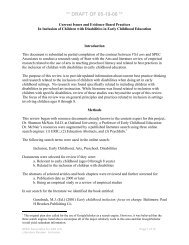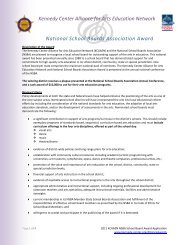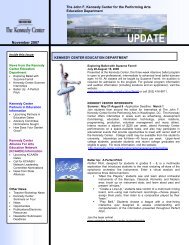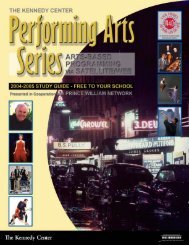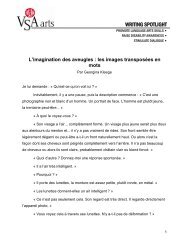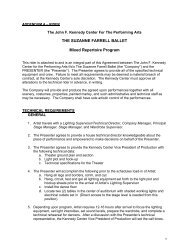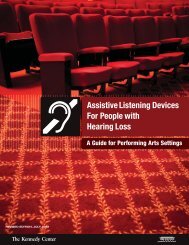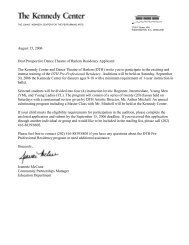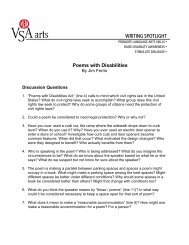Playwright Discovery Award Teacher's Guide - The John F. Kennedy ...
Playwright Discovery Award Teacher's Guide - The John F. Kennedy ...
Playwright Discovery Award Teacher's Guide - The John F. Kennedy ...
Create successful ePaper yourself
Turn your PDF publications into a flip-book with our unique Google optimized e-Paper software.
Discussion Questions<br />
1. What characters with disabilities have you seen<br />
in movies, television, and plays? Can you think<br />
of examples of the following characters with<br />
disabilities?<br />
a. Villainous Monsters<br />
b. Innocent Victims<br />
c. Freakish Fantasy Creatures<br />
d. Heroic Inspirations<br />
e. Characters that complicate or defy stereotypes<br />
2. Can you think of characters from movies,<br />
television, and plays that do not fall into any of<br />
these categories? Or characters that only partially<br />
fit these categories? Or characters that have<br />
elements from more than one category? Explain<br />
your choices.<br />
3. What attitudes about disability have you<br />
encountered in your life? How have these attitudes<br />
made you or others feel?<br />
4. Think of alternate ways of expressing the same<br />
meanings in these phrases without using disability<br />
metaphors.<br />
a. His explanation of the crime was just a lame<br />
excuse for greediness.<br />
b. He was blind to the possibilities of earning a<br />
college degree.<br />
c. <strong>The</strong> ruler turned a deaf ear to the plight of the<br />
peasants.<br />
d. Our nation is crippled by economic recession.<br />
e. That homework assignment was retarded.<br />
f. You are such a spaz!<br />
Considering Non-Apparent<br />
Disabilities Such as Autism<br />
Non-apparent disabilities pose a playwriting<br />
challenge. How do you convey how a person<br />
thinks if speech and movement are difficult? Nonapparent<br />
disabilities may interest some playwrights<br />
but be difficult to realize for the stage. A way to<br />
create a character or situation may be to consider<br />
how strategies for success might influence<br />
dramatic choices.<br />
Autism has been stereotyped in many forms<br />
of entertainment. When most think of autism,<br />
thoughts of Raymond Babbitt from Rain Man<br />
come to mind. Many people see this character<br />
and believe that all people with autism must be like<br />
Rain Man—extremely intellectual, able to count<br />
items at lightning speed, and have extreme and<br />
erratic behavior. <strong>The</strong> 2010 HBO television movie<br />
Temple Grandin is based on the early life of the<br />
world-famous animal scientist. Dr. Temple Grandin<br />
is a high-functioning woman with autism. Through<br />
some intriguing film techniques, the movie helps<br />
viewers understand how Dr. Grandin processes<br />
information differently from other people. However,<br />
it does not depict her as behaving in extreme or<br />
erratic ways like Rain Man, because not everyone<br />
with autism behaves similarly. <strong>The</strong>se characters<br />
represent two types of autism. <strong>The</strong>re are many<br />
different levels of autism with incredibly different<br />
symptoms. In fact, autism is a highly complex<br />
disorder. Many individuals today with autism can<br />
succeed at school and in the workplace. People<br />
with autism are still just that—people—and like<br />
every person on the planet they each have their<br />
own personalities, likes, and dislikes. View them for<br />
who they are and not who you expect them to be.<br />
ACT I: PREPARATION 13



